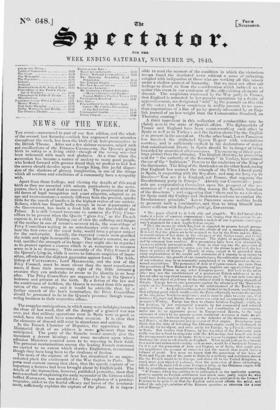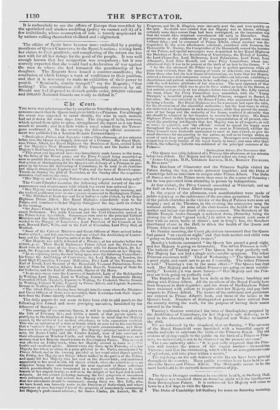The sanguine anticipations, in which many were indulging towards the
close of last week, that all the danger of a general war was over, and that military operations even in Syria were as good as ended, have this week been somewhat overcast. It is clear that the elements of discord still exist ill abundance and activity.
In the French Chamber of Deputies, the opposition to the Ministerial draft of an address is more rhement than was anticipated. The party of the Gauche would scarcely give the document a decent hearing; and some members, upon whose adhesion Ministers counted seem to be wavering in their faith. The personal recritninations among the leading French statesmen are carried to all extent which startles Englishmen, accustomed though they have long been to the virulence of fitction. The news of the capture of Acre has stimulated to an unpre- cedented pitch the excitement of the War faction in Paris. Re- ports were current among that class that the speedy capture of so important a fortress had been brought about by English gold. The details of the transaction, however, published yesterday, show that such a method of explaining.the early surrender of the fortress winch baffled NAPOLEON, was uncalled-for. The explosion of a powder- magazine, added to the fearful efficacy and havoc of the bombard- ment, sufficiently explains the capture of the place. It is hopes- sible to read the account of the condition in which the victorious troops found the desolated town without a sense of sickening, mingled with indignation at those wlio are working all this misery under a shallow pretext of humanity. But we 111Wat not allow Our fbelings to divert us from the consideration which induced us to notice this event in our catalogue of the still-existing elements of discord. The suspicions expressed by the War party in France, that England is animated in her present operations by a desire of aggrandizement, are designated " wild" by the journals on this side of the -..eiter; but these suspicions in reality amount to no more than imputations of' a line of po icy gravely advocated by an Eng- lish journal of no less weight than the Conservative Siandurd, on Thursday evening.* A third ingredient in this collection of combustibles may be plainly seen in the state of Spanish affitirs. The diplomatists of France and England have been counterworking each other in Spain as well as in Turkey ; and the faction abetted by the English is at present in the ascend int. On the other baud, Louis Pam peR has received the abdicated Queen Regent with ostentatious courtesy, and is sufficiently explicit in his declarations of regret that constitutional liberty in Spain should be in danger of being hazarded by anarchical utfurvescences. The meaning of this is per- haps plainer than the phrasing. The English :Ministry, by professing zeal for " the authority of the Sovereign " in Turkey, have gained the ear of the " legitimate" Powers to the exclusion of the King of the Barricades. The King of the Barricades on the other hand, seeing that England has secured the triumph of the Ultra Liberal party in Spain, is coquetting with the Royalists, and may ere long say to Russia—" You see it is England, not France, that supports the Revolutionary party in Europe." Already our Conservative jour- nals are congratulating themselves upon the prospect of the re- storation of " a good understanding, among the Spanish branches of the Bourbons" ; and suggesting that " there can be no salvation tbr Spain until the Carlists and Moderados coalesce to combat the Revolutionary, principle." Lolls Pnimeen seems nothing loath to promote such -a combinathm, and thus to bring himself into direct collision with England's protg6, ESPARTERO.
* The paper alluded to is bath aide and plausible. We had intended to make it a topic of separate commentary : but, /biding that this cannot be ac- complished at present, we merely subjoin a sample of our ingenionJ contempo- rary's argument for a new Anglo-Syrian empire.
" That the means by whieb England is expected to possess herself perma- nently or Acre and Cyprus are lil;itimate, admits of not a moment's dispute. It is said that the places are to be assigned to her by the Porte and its Allies, iii consid erat ion of her share in the conquest of the Syrian coast, and in the restoration of Syria to its rightful owner. The rights of acquisition by gift mid by conquest here combine. Few possessions have been ever obtained by means so entirely unexceptionable. Next, in what way can the possession of Acre and Cyprus disturb the status quo (or, it the phrase is preferred, the ha- lance of power) of Europe? Clearly in none, except it be pretended that every augmentation of the wealth and commerce of a country is an injury to other countries; the growth of our manufactures, the cultivation and extensimt of our colonies, may be as reasonably complained of on this ground as the
as-
summed acquisitions. The possession of Acre or Cyprus cannot, any more than the possession of New Zealand or Sincapore, improve our opportunities of ag- gression upon France or any other European power. Bat look to the other skle : may not the establishment of a permanent British settlement in the Levant offer an important security to the status quo? It is not tube concealed that the just object of jealousy to the civilised world is the growing strength of Russia. Europe has no sure guarantee against the advances of the 'Muscovite empire on the Eastern side, except in the reinforcement of the Turkish em- pire. * * * An English settlement established in the Levant, would supply that rallying-point which would etiqh1.2 the Porte effectually to resist the assait:t of its langeraus Nlirthern neighbour ; and it must be plain to every ;MC, that between Eh gland and Russia there never can exist any community id. interest as regarOs Turkey. Europe lias then to choose between England ; which, by her positim, by her commercial pursuits, by her commercial and colonial responsibilities, above all by lu r Ii tbits amt constitution of government, never can ho an aggressive pfexer in Europe—mid ItmAa, to the very existence of width by its present system territorial i xtension is made an ab- solute necessity ; betweett England, as the defender of the Ottoinan empire, and Russia, as the conqueror and pes,essor of that empire. Frenchmen 'nay think that the duty of defending the Ottoman empire could be discharged as effectually for its object, and more satdy for Europe, hy a French settlement in Syria. But besides that France, by her des..'rtion of the Porte—for such realty was her refusal to coilperate unit the Allies—has shut herself out front the arrangements now to be made, there is no reason to suppose that she could discharge the duty as effectually as England. NV bat might perhaps be a benefit to it naval nail commercial country :inch as ours, would be a burden to France ;
for it is not the possession of Acre and Cyprus, or of Syria, that could give our neighbours the amount of commerce and the marine that would leave a balance of profit. Nor must we forget that the possession of the keys of
Syria and Egypt, and of the route to India by a military and ambitions nation like tlw Frenai would be to Europe, and above all to the United Kingdom, a much more just object of jealousy, th in the possession of these advantage!, which, after all, must fall to some Enropeim state, or the Ottoman empire wa fall, by it :military and unambitious trading England. "II' France, which has nothing to be endangered in the particular quarter, protests against an English settlement, how much more justly might we, who would have India exposed, protest against a French settlement in the Levant ? It scents to he quite el:or that the English settlement affords the safest, and. indeed the only .snle, solution of the Eastern question as concerns the raise quo of Europe."
It is melancholy to see the affidrs of Europe thus unsettled by the egotistical and aimless meddling (policy we cannot call it) of a few individuals, whose assumption of rule is tamely acquiesced in by nations calling themselves civilized and enlightened.



























 Previous page
Previous page